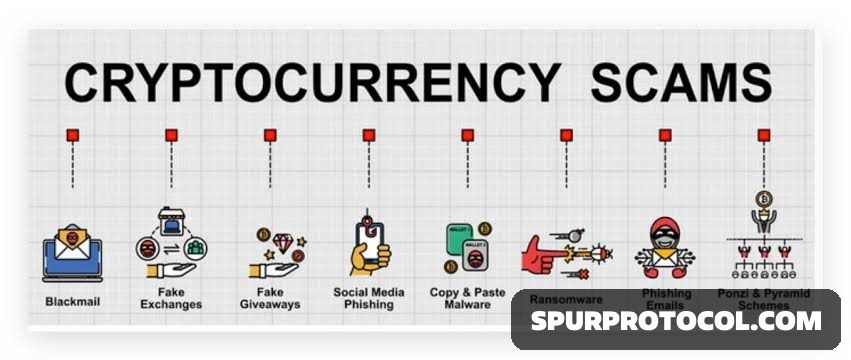DIFFERENT TYPES OF CRYPTO SCAMS
CRYPTO SCAMS YOU SHOULD BE AWARE OF
Go Back
🕒 6:57 PM
📅 Mar 27, 2025
✍️ By MONSIGNOR11
CRYPTO SCAMS YOU SHOULD BE AWARE OF
Go Back
🕒 6:57 PM
📅 Mar 27, 2025
✍️ By MONSIGNOR11
Ponzi Schemes (e.g., OneCoin):
These scams promise high returns with little or no risk. Early investors are paid using the funds of newer investors, rather than from any legitimate profit. Eventually, the scheme collapses when new investors stop joining, and the operators disappear with the funds.
Phishing:
Scammers impersonate legitimate cryptocurrency platforms or services to trick users into providing sensitive information such as private keys, login credentials, or seed phrases. These can be done through emails, fake websites, or social media messages.
Rug Pulls:
In decentralized finance (DeFi), a "rug pull" happens when the developers of a cryptocurrency or token project suddenly withdraw all the liquidity or funds, leaving investors with worthless tokens. This typically occurs with new or poorly vetted projects.
Pump and Dump Schemes:
Scammers artificially inflate the price of a cryptocurrency by creating hype and attracting investors, only to sell off their holdings once the price has risen. Afterward, the price crashes, and those who bought in during the "pump" lose their investments.
Fake Initial Coin Offerings (ICOs):
In this scam, fraudsters launch a fake ICO, claiming to sell tokens for a new crypto project. They collect investors' funds but never deliver on the promised product or service, vanishing with the money.
Investment Scams (High Returns Promises):
Scammers often promise high returns in exchange for investment in a cryptocurrency project or trading bot. Once the investor sends their funds, the scammers disappear, and the promised returns never materialize.
Fake Exchanges:
Fraudsters set up fake cryptocurrency exchange platforms that look legitimate, often with attractive sign-up bonuses. Once users deposit their crypto, they find that they cannot withdraw or access their funds.
Social Media Scams:
Scammers use social media platforms like Twitter, Telegram, or Discord to impersonate well-known crypto figures, celebrities, or companies. They promise giveaways, airdrops, or discounts, but in reality, they are just trying to steal users' funds or personal information.
Mining Scams:
These scams involve fake cloud mining services or "mining pools" that promise users can mine crypto by investing in their platform. In reality, the scammers take the users' investment without providing any mining services.
Fake Wallets and Apps:
Scammers develop fake crypto wallets or mobile apps that look like legitimate ones. After users deposit their crypto into these wallets, the scammers steal it, and users are left with nothing.
Romance Scams (Crypto Version):
Scammers use dating apps or social media to form romantic relationships with victims and then convince them to send money or cryptocurrency under the pretense of emergency situations, investment opportunities, or "business deals."
It's important to always conduct thorough research and be cautious when interacting with cryptocurrency platforms or individuals you don't know.